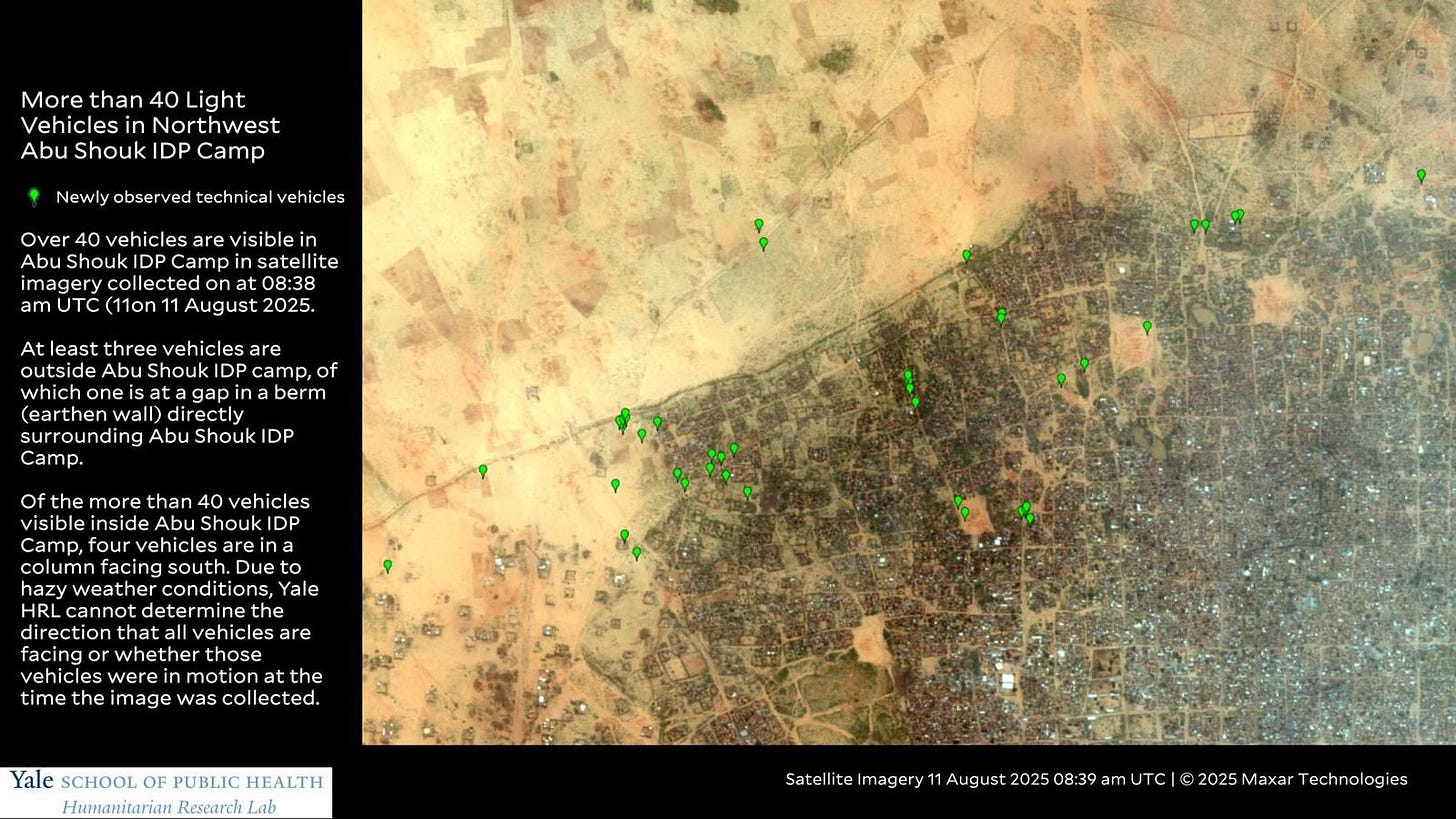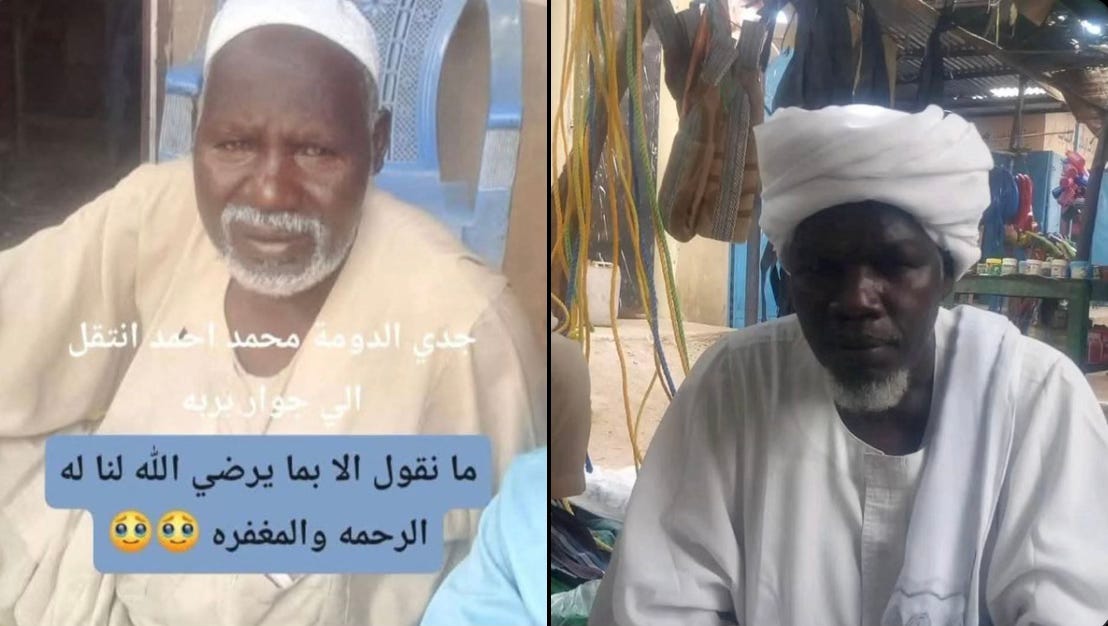RSF Attack on Abu Shouk Kills Dozens
Joint Force repulses latest assault on northern El Fasher suburb
A coordinated assault by the Rapid Support Forces (RSF) against Abu Shouk Camp in northern El Fasher on Monday, August 11, left dozens of dead, including both combatants and civilians.
The Abu Shouk Emergency Room, a local community group, published a preliminary list of 34 civilian victims Tuesday following earlier estimates of more than 40 deaths due to “stray bullets and direct executions.” The listed fatalities were mostly young and middle-aged men, with a few women and older men included.
Sheikh Mohamed Suleman Yagub (age 62), imam of the Navaisha Market Mosque, was among the dead, as well as Al-Duma Mohammed Ahmed (age 70), a respected teacher. At least four others were wounded, and several were still missing.
Though called a “camp,” Abu Shouk is more than 20 years old and now consists largely of permanent or semi-permanent buildings. RSF fighters on foot and in combat vehicles entered Abu Shouk through alleyways and dirt roads, attacking along three axes and penetrating several kilometers into the camp.
The RSF clashed for several hours with armed groups allied with the Sudanese military, collectively called the Joint Force. Both sides suffered casualties in terms of men and equipment before the RSF eventually withdrew.
Yale Humanitarian Research Lab, which has been tracking the conflict, analyzed satellite images of Abu Shouk Camp taken during the fighting yesterday. In a report, the Yale researchers said that they identified 40-plus light vehicles throughout northwest Abu Shouk IDP Camp, consistent with reports of an RSF attack. The report also noted the appearance of roadblocks using tire pylons on roads leading from El Fasher north toward Melit and Kutum, illustrating RSF control of these escape routes.
This attack against Abu Shouk Camp is one of many that have occurred against El Fasher and its outlying camps since more than a year ago. The city is under siege. The prolonged fighting and lack of supplies has caused widespread malnutrition and a collapse of health services. Though thousands have fled from El Fasher, many thousands more remain, trapped or unwilling to leave.
Abu Shouk IDP Camp was formed by the survivors of the first Darfur Genocide in the early 2000s. The community is predominantly composed of Fur, Zaghawa, and other non-Arab communities who fled the Arab Janjaweed, the predecessor of the RSF.
Radio Dabanga reported yesterday that El Fasher’s healthcare system has nearly totally collapsed. The Children's Hospital, Southern Hospital, Saudi Hospital, and Military Hospital have been shelled, rendering them mostly inoperable, while limited health centers lack medicines and medical supplies, including gauze, surgical instruments, and life-saving medications.
“Reports indicate maternal deaths after childbirth, children without care or alternative food, as well as injuries and deaths due to the use of local antibiotic alternatives and the lack of medical supplies.”
“Surrounding camps, such as Abuja and Naivasha, have not been spared from the bombing and siege. Some, such as Abuja, have been transformed into military headquarters for the Rapid Support Forces, while their main markets have been put out of service. As a result, approximately 80% of the population of Naivasha camp has left, amid widespread malnutrition and high mortality rates, especially among women and children.”
The United Nations Humanitarian Coordinator in Sudan, Sheldon Yett, issued a statement Tuesday saying he was “appalled by reports of a large-scale attack on the El Fasher area, the besieged capital of North Darfur State, including the Abu Shouk displacement camp.” The UN official added:
“Abu Shouk camp is already among the famine-hit areas in North Darfur… We continue to receive deeply troubling reports that the siege and intensifying hostilities have left people in El Fasher with extremely limited access to food, safe water and medical care. Recent reports that in just one week, more than 60 people — most of them women and children — have died from malnutrition in El Fasher, are also extremely worrying.
“I once again convey the humanitarian community’s call for the protection of civilians, an end to the siege and unrestricted access to people in need. The immediate provision of safe and unhindered passage for people seeking to flee El Fasher and other areas of active hostilities is critical
“I reiterate the UN Secretary-General’s call for a humanitarian pause in and around El Fasher to allow the delivery of food, water, medicine and other life-saving supplies to those trapped in the city and facing acute hunger and starvation.
“All those engaged in the conflict must uphold their obligations under international humanitarian law: to protect civilians and civilian infrastructure, to allow safe passage, and to facilitate unimpeded humanitarian access.”
Videos
Fighters belonging to the Sudan Liberation Movement-Transitional Council led by Gen. Osman Abdel-Jabbar and Salah Rassas (which split from the SLM-TC led by Al-Hadi Idris last year) with a burning RSF armored car, likely SPARTAN MAV produced by STREIT Group based in the UAE. Abu Shouk Camp, Aug. 11, 2025.
SAF-allied fighters identifying as ‘Popular Resistance,’ who also use pro-Joint Force slogans, at the livestock market in western El Fasher, 10 August 2025.
RSF with captured captured APC, Abu Shouk Camp, 11 August 2025



